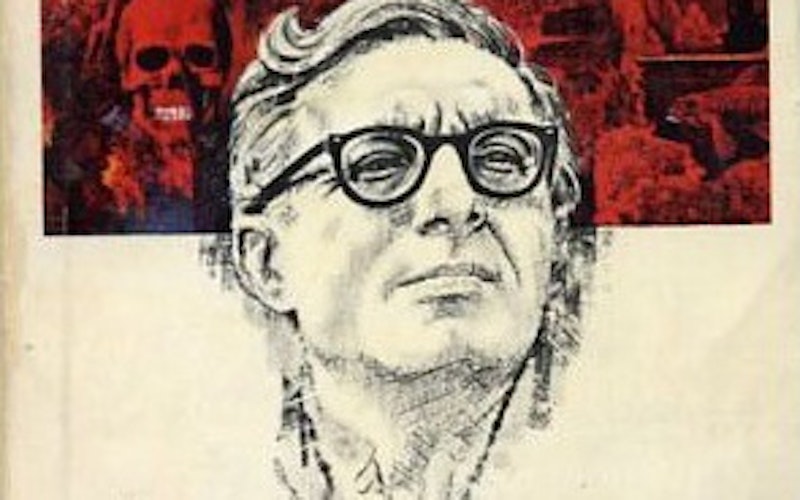
Culture At Large
What Ray Bradbury understood about innocence and loss
Andy Rau •
"The seller of lightning rods arrived just ahead of the storm." - Ray Bradbury, Something Wicked This Way Comes
The seller of lightning rods arrived in my life at just the right time. I was in my mid-20s, and my excitement at graduating into the world of adulthood was starting to be tempered by a nagging awareness of what had been lost in that transition from boy to grownup. Something Wicked This Way Comes is the story of a young boy's adventures during the last fading months of innocence. It captures the mix of emotions characteristic of the coming-of-age tale: excitement and pride at growing up, sorrow at the loss of innocence and disappointment at the dearth of wonder and mystery in the grownup world.
With Ray Bradbury's passing this week, many reflections have focused on his classic Fahrenheit 451. But Something Wicked and Dandelion Wine define the under-appreciated "boyhood nostalgia" genre, and in them I think Bradbury has left an even stronger legacy than in his more traditional science fiction. Many other writers have walked in his footsteps (and science fiction and horror authors do it best): Stephen King (It), Clive Barker (The Thief of Always), Robert McCammon (Boy's Life), Peter Straub (Shadowland). But none of these stories can match Bradbury's poetic writing style.
Bradbury had an eye for aspects of spirituality that escape most authors, Christian or otherwise. For one, he acknowledges the genuine attractiveness of evil, while also recognizing its ultimate emptiness. Something Wicked's villain tempts his victims into sin not with stereotypical, debauched rewards (endless power, sex, money!), but with the promise of something simple, wholesome and good. To children, he promises the knowledge and maturity of adulthood. To weary and disillusioned grownups, he offers a second chance at youth. To Bradbury, effective temptation simply points at the empty spots in our lives and promises to fill them with something wonderful.
Bradbury had an eye for aspects of spirituality that escape most authors, Christian or otherwise.
But when you strive for something good in a way that makes a mockery of that good, or when you set your heart on something that isn't yours to claim, you’re spiritually worse off than before. In the end, Bradbury’s heroes realize that the fulfillment offered by evil is an empty joke, and that when we stop feeding temptation, it loses its hold over us. "Evil has only the power that we give it. I give you nothing. I take back. Starve. Starve. Starve," Mr. Halloway chants in the final confrontation with Mr. Dark.
Bradbury also explores the power of regret and sadness, but doesn’t link them to despair or nihilism. Nostalgia for the past, and longing for a world that was once better than it is now, are not things to be avoided but rather accepted as part of the human experience. The grownups (and almost-grownups) in Bradbury's work feel the loss of childhood's wonder and know that they'll never fully return to it in this life. The children long to grow up, but must wait patiently for adulthood to arrive in its own time.
These are themes that should ring true for most followers of Christ. We wince with the regret of “wasted” years spent on self-centered pursuits before we met Christ. We occasionally wish we could retreat to a state of spiritual childhood, before we understood the weight of sin and the Law. We await the realization of a better world, even as the world we live in systematically crushes innocence and steals hope. There is sadness in these emotions - and religion today works hard to keep you from thinking sad thoughts - but these are human emotions. We are defined by our losses, missed chances and not-yet-realized hopes as much as by our more happy achievements. (Of the various Christian fantasists of the 20th century, I think only J.R.R. Tolkien matches Bradbury's sad but determined nostalgia for what we’ve left behind or cannot attain.)
Ray Bradbury's understanding of innocence, evil and human nature made him one of the most insightful writers of our time. With his death, another piece of childhood mystery has left the world - and I think Bradbury would tell us to appreciate the pain of that loss.
What Do You Think?
- What other writers capture the bittersweet nature of nostalgia with the effectiveness that Bradbury did?
- Much nostalgia literature is specifically about boys and their growth into manhood. What are some female equivalents or counterpoints?
- What is the place of regret in a life of faith?
Topics: Culture At Large, Arts & Leisure, Books, Theology & The Church, Faith